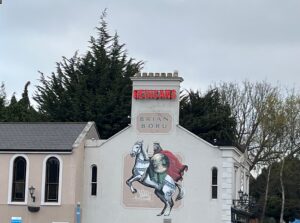 Last week, we asked whether The Bloody Stream can officially be considered a railway pub. Answer: yes! This week, we are visiting a pub that will eventually (in theory) be disappearing to make way for the proposed MetroLink: Hedigan’s The Brian Boru. But all things planning- and/or transit-related in Dublin take much, much longer than they do in most other places, so you likely have a goodly amount of time to visit the pub in advance.
Last week, we asked whether The Bloody Stream can officially be considered a railway pub. Answer: yes! This week, we are visiting a pub that will eventually (in theory) be disappearing to make way for the proposed MetroLink: Hedigan’s The Brian Boru. But all things planning- and/or transit-related in Dublin take much, much longer than they do in most other places, so you likely have a goodly amount of time to visit the pub in advance.
It’s hard to miss it if you’re walking by – the well-kept mural of its namesake king on horseback takes up most of one wall, and while his horse and armour may be a bit more High Victorian Medieval Fantasy than 11th century, well…you probably also don’t believe that Brian Boru ‘camped on this spot‘ before the Battle of Clontarf…and that’s perfectly acceptable. But historical facts need not interfere with the enjoyment of a pleasant bit of neighbourhood art, so we’ll move swiftly inside. There are multiple snugs and seating areas, two bars and even a bright conservatory, so you can get the full dark-wood ‘Irish Pub’ experience or even catch some occasional sun in the spacious beer garden to the rear of the pub. Beer-wise, Little Fawn from The White Hag is the only independent offering, but there’s also Beamish as well as Guinness, plus the useful Guinness 0.0 and Heineken 0.0 options.
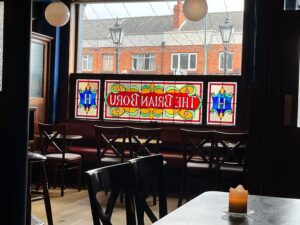 The pub has been here since the 1850s, and in the Hedigan family since 1904, and you can’t miss their name in neon, either. Of course, like so many pubs along this route, it’s name-checked in Ulysses, and has a useful write-up on the NBHS website, where it’s noted that its own house whiskey blend was particularly fine, and that ‘…traditionally held to be the only pub in Ireland that did not run out of whiskey during the Second World War.’ So, there’s a fair amount of history to the place – well over 200 years, all told, and there was likely an earlier pub (or pub-like) business on the spot, too. And yet, it will all have to go for the MetroLink (at some point in the future)…so what does a transit-loving pub nerd do with that information?
The pub has been here since the 1850s, and in the Hedigan family since 1904, and you can’t miss their name in neon, either. Of course, like so many pubs along this route, it’s name-checked in Ulysses, and has a useful write-up on the NBHS website, where it’s noted that its own house whiskey blend was particularly fine, and that ‘…traditionally held to be the only pub in Ireland that did not run out of whiskey during the Second World War.’ So, there’s a fair amount of history to the place – well over 200 years, all told, and there was likely an earlier pub (or pub-like) business on the spot, too. And yet, it will all have to go for the MetroLink (at some point in the future)…so what does a transit-loving pub nerd do with that information?
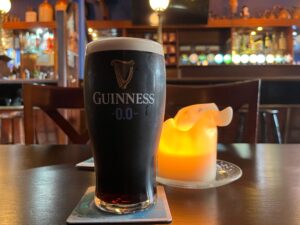 Well, there have been proposals to name the future station here for the pub, possibly including some of the pub’s architectural details. And while the MetroLink wouldn’t be anything on the scale of the Tube, there’s plenty of precedent for naming stations after both extant and long-vanished pubs over on the Neighbouring Island. And it’s not as though this part of Dublin, where Phibsborough turns into Glasnevin, is short of pubs – there are many excellent ones in the area. All the same, it’s a bit of a shame there’s not a good way to incorporate the pub more fully into the eventual station, but we also desperately need real transit to the airport (among other places).
Well, there have been proposals to name the future station here for the pub, possibly including some of the pub’s architectural details. And while the MetroLink wouldn’t be anything on the scale of the Tube, there’s plenty of precedent for naming stations after both extant and long-vanished pubs over on the Neighbouring Island. And it’s not as though this part of Dublin, where Phibsborough turns into Glasnevin, is short of pubs – there are many excellent ones in the area. All the same, it’s a bit of a shame there’s not a good way to incorporate the pub more fully into the eventual station, but we also desperately need real transit to the airport (among other places).
So, I suppose the message is to enjoy this pub while you can…though given how slowly the MetroLink project has gone thus far, you may have a few decades to stop by.
Where: 5 Prospect Rd, Glasnevin, Dublin, D09 PP93
Access from the city centre: Buses 9, 40, 46A, 83, 140; Luas Green Line; 30ish minute walk
Food: Lunch, dinner & kids’ menus
Sport: Football, GAA, rugby, etc…
TVs: Throughout the pub
Music: Indie faves, but also trad sessions and other live gigs
Family-friendliness: Very approachable menu and seating options
Pub-crawl-ability: High – The Bald Eagle, Doyle's Corner, The Boh, The Hut and The Back Page in one direction, with The Botanic, The Gravediggers and The Tolka House in the other…
Local sites of note: Royal Canal, Glasnevin Cemetery, National Botanic Garden, Dalymount Park
Haunted: While not as close to the cemetery as The Gravediggers, surely it’s near enough for someone to craft a good ghost story
Other notes: Can get quite crowded before Bohs games; also pet-friendly
Socials: Instagram, Facebook
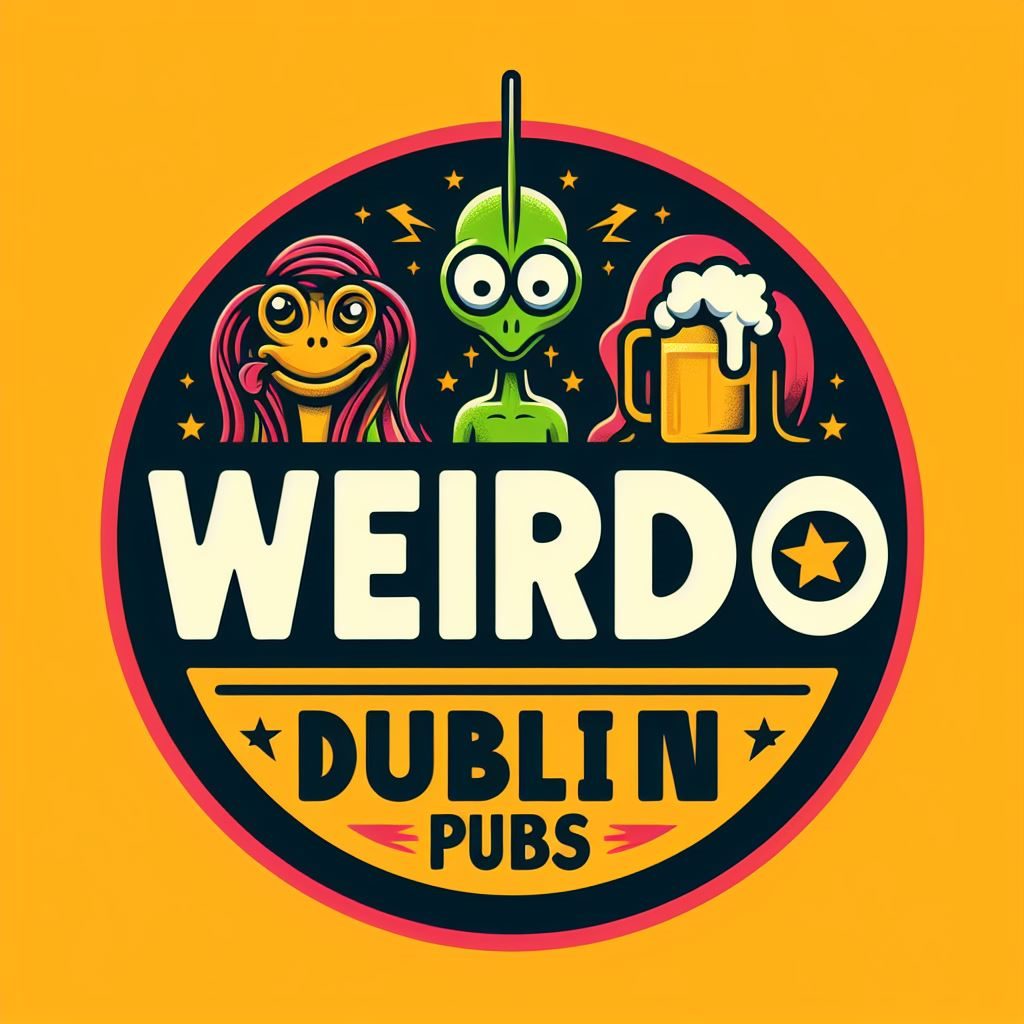
 We are back this week with a ‘request pub’ – one that’s much further north than our more common north-of-the-Liffey-but-still-pretty-central stomping grounds. We’re heading out of Dublin City proper to Howth; it’s an easy trip on the DART, but a bit of a pain if, for example, you needed Dublin Bus to deposit you to a nearby spot at a predetermined time. Dublin Bus is not always especially good at the concept of ‘on time’ (but it’s pretty great on ghost buses), so the journey in this general direction involved more taxis than I typically take in a 6-month period, but we got there in the end. Our (eventual) destination was
We are back this week with a ‘request pub’ – one that’s much further north than our more common north-of-the-Liffey-but-still-pretty-central stomping grounds. We’re heading out of Dublin City proper to Howth; it’s an easy trip on the DART, but a bit of a pain if, for example, you needed Dublin Bus to deposit you to a nearby spot at a predetermined time. Dublin Bus is not always especially good at the concept of ‘on time’ (but it’s pretty great on ghost buses), so the journey in this general direction involved more taxis than I typically take in a 6-month period, but we got there in the end. Our (eventual) destination was  I’d recently had an exchange on the socials lamenting the lack of railway station bars in Ireland, and while we have nothing here quite like the small-but-mighty
I’d recently had an exchange on the socials lamenting the lack of railway station bars in Ireland, and while we have nothing here quite like the small-but-mighty 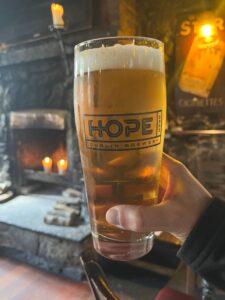 We enjoyed excellent food and service when we stopped in, which isn’t necessarily a given in some pubs mid-week in the middle of the afternoon (hardly a fruitful time for most), so it was much appreciated. There is outdoor seating as well around both ends of the pub, but we kept to the more dimly-lit interior on a lovely sunny afternoon. Having offspring who actively avoid the sun may be odd to others, but hey, at least their vampiric ways are preventing long-term sun damage, and the pub interior really is lovely, all stone and dark wood.
We enjoyed excellent food and service when we stopped in, which isn’t necessarily a given in some pubs mid-week in the middle of the afternoon (hardly a fruitful time for most), so it was much appreciated. There is outdoor seating as well around both ends of the pub, but we kept to the more dimly-lit interior on a lovely sunny afternoon. Having offspring who actively avoid the sun may be odd to others, but hey, at least their vampiric ways are preventing long-term sun damage, and the pub interior really is lovely, all stone and dark wood.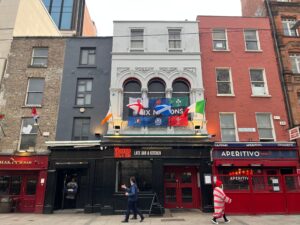 Back in the day – you know, perhaps 3 years ago – this week’s pub was The Porterhouse Central. It was a very handy spot in that you could enjoy a mix of interesting beers from Porterhouse and various guest options, but you avoided
Back in the day – you know, perhaps 3 years ago – this week’s pub was The Porterhouse Central. It was a very handy spot in that you could enjoy a mix of interesting beers from Porterhouse and various guest options, but you avoided 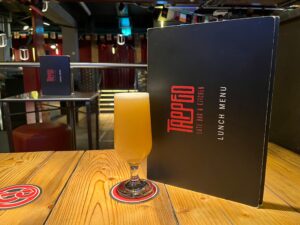 However, I happened to be in the area and had a bit of time after a meeting, so I gave Tapped another try. I’m pleased to say that the interior, while still feeling just slightly too ‘taproom’ has been softened and improved. There is now much more comfortable seating and the lighting is more dialled-in; it feels warmer on the whole. There are screens showing the beer lineup,
However, I happened to be in the area and had a bit of time after a meeting, so I gave Tapped another try. I’m pleased to say that the interior, while still feeling just slightly too ‘taproom’ has been softened and improved. There is now much more comfortable seating and the lighting is more dialled-in; it feels warmer on the whole. There are screens showing the beer lineup, 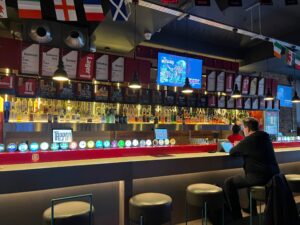
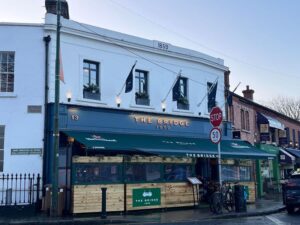 While it may seem that we rarely venture south of the Liffey (true, really), we recently had occasion to be down in our old Ballsbridge stomping grounds, and so returned to
While it may seem that we rarely venture south of the Liffey (true, really), we recently had occasion to be down in our old Ballsbridge stomping grounds, and so returned to 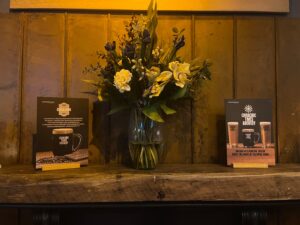 There has been much local discussion surrounding the launch of
There has been much local discussion surrounding the launch of 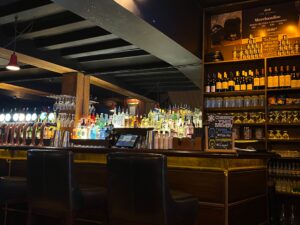 And that may be all well and good for many customers, but these new brews haven’t (mostly) muscled out the usual macro suspects; it’s the ‘good’ beers that have been jettisoned to make space, including – really a loss here – the Pilsner Urquell. Removed from The Bridge’s menu now are Rye River Upstream Pale Ale, Warsteiner lager and, er, Madri. The Madri may be no great loss, but the others are keenly felt (especially if, say, A Friend were really looking forward to a Pilsner Urquell, sighed to make do with a Warsteiner and then realised that the only drinkable lager was Carlsberg). To add insult to injury, the hand-painted panel all about Pilsner Urquell has been partially, but not entirely, covered by a television. Ouch.
And that may be all well and good for many customers, but these new brews haven’t (mostly) muscled out the usual macro suspects; it’s the ‘good’ beers that have been jettisoned to make space, including – really a loss here – the Pilsner Urquell. Removed from The Bridge’s menu now are Rye River Upstream Pale Ale, Warsteiner lager and, er, Madri. The Madri may be no great loss, but the others are keenly felt (especially if, say, A Friend were really looking forward to a Pilsner Urquell, sighed to make do with a Warsteiner and then realised that the only drinkable lager was Carlsberg). To add insult to injury, the hand-painted panel all about Pilsner Urquell has been partially, but not entirely, covered by a television. Ouch.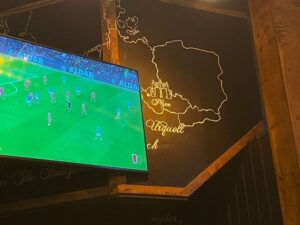
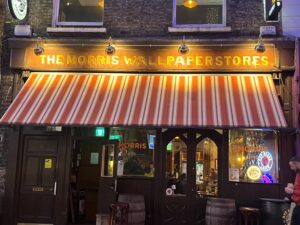 Sometimes, just sometimes, a fantastic new(ish) pub pops up where you least expect it. Dublin’s Talbot Street has had a lot of publicity
Sometimes, just sometimes, a fantastic new(ish) pub pops up where you least expect it. Dublin’s Talbot Street has had a lot of publicity  At that time, the shopfront that is now the pub was The Morris Wallpaper Stores, and the signage from that era has been preserved above the door. The theme continues inside, with framed William Morris wallpaper samples on the exposed brick, giving a mix of industrial chic and cosy early-20th century-pub vibes. There’s a pizza spot toward the back (check for opening hours, as these things evolve) with more communal-styles tables, but the seating in the main bar is much ‘pubbier,’ and very comfortable indeed.
At that time, the shopfront that is now the pub was The Morris Wallpaper Stores, and the signage from that era has been preserved above the door. The theme continues inside, with framed William Morris wallpaper samples on the exposed brick, giving a mix of industrial chic and cosy early-20th century-pub vibes. There’s a pizza spot toward the back (check for opening hours, as these things evolve) with more communal-styles tables, but the seating in the main bar is much ‘pubbier,’ and very comfortable indeed.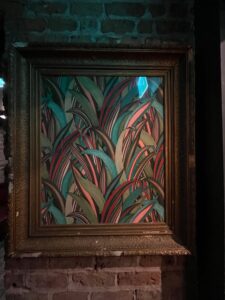 There’s a good mix of the usual Guinness-and-friends offerings, but also a handy Rye River tap, as well as Beamish for the Corkonians in your life. The cocktail list is interesting as well. On our visit, the staff were all wonderful, and the attention to detail that went into the design of the pub is evident. It hits just the right mark of honouring the building’s past without feeling like a theme pub.
There’s a good mix of the usual Guinness-and-friends offerings, but also a handy Rye River tap, as well as Beamish for the Corkonians in your life. The cocktail list is interesting as well. On our visit, the staff were all wonderful, and the attention to detail that went into the design of the pub is evident. It hits just the right mark of honouring the building’s past without feeling like a theme pub.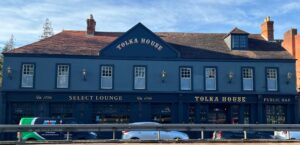
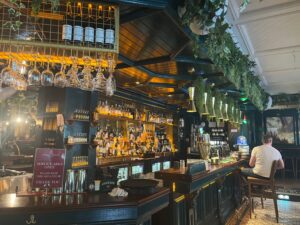 While it was likely something akin to a coaching inn in that earlier phase – again, like its not-too-distant neighbour in Drumcondra – having a tourist site spring up nearby in the form of the National Botanic Gardens in the 19th century was a boon to business, similar to the relationship between the nearby
While it was likely something akin to a coaching inn in that earlier phase – again, like its not-too-distant neighbour in Drumcondra – having a tourist site spring up nearby in the form of the National Botanic Gardens in the 19th century was a boon to business, similar to the relationship between the nearby 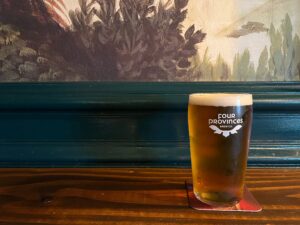
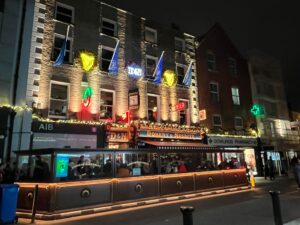 We kick off our 2025 pub-visiting endeavours with a stop off at
We kick off our 2025 pub-visiting endeavours with a stop off at  Its more
Its more 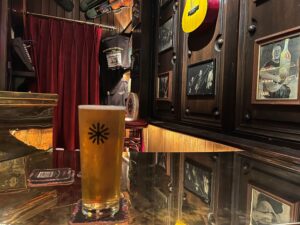 Some of that may also come from its beer selection; there’s the usual Guinness-and-macros lineup (plus Murphy’s), as well as two new taplines from
Some of that may also come from its beer selection; there’s the usual Guinness-and-macros lineup (plus Murphy’s), as well as two new taplines from 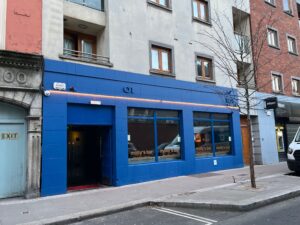 It’s been a minute since we’ve been to an entirely new pub, so it was good fun to make it in to
It’s been a minute since we’ve been to an entirely new pub, so it was good fun to make it in to 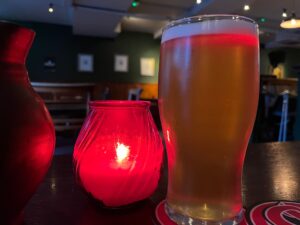 While much of
While much of 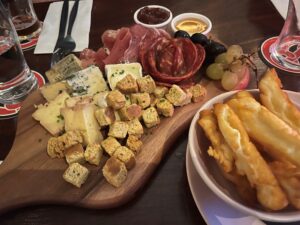 The best news for beer fans is that unlike several of the ex-Galway Bay pubs, we have their core lineup, and there will be other guest beers as well in the future. But you can also bring your Guinness nerds and other macro-beer friends here – they are by no means left out, and there are cocktails as well. On our visit, everything was lovely and fresh (as you might expect) – the Lush and Full Sail were both in excellent form. Food, too, was more varied than the standard menu, or else it’s changed again – either way, the addition of the charcuterie board was most welcome, and the halloumi fries are as good as ever.
The best news for beer fans is that unlike several of the ex-Galway Bay pubs, we have their core lineup, and there will be other guest beers as well in the future. But you can also bring your Guinness nerds and other macro-beer friends here – they are by no means left out, and there are cocktails as well. On our visit, everything was lovely and fresh (as you might expect) – the Lush and Full Sail were both in excellent form. Food, too, was more varied than the standard menu, or else it’s changed again – either way, the addition of the charcuterie board was most welcome, and the halloumi fries are as good as ever.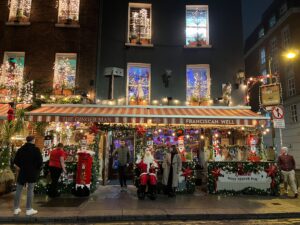 In the immortal words of
In the immortal words of 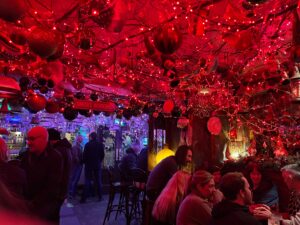 There can be a bit of a dark side to going all in on Christmas, though – a pub might attract groups of Twelve Pubs of Christmas revellers. Now, I like a
There can be a bit of a dark side to going all in on Christmas, though – a pub might attract groups of Twelve Pubs of Christmas revellers. Now, I like a 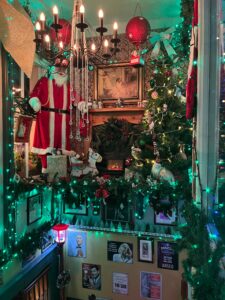 Well, as mentioned, they have the ideal backdrop for the social media documentation of their special day – there is no corner of the pub lacking holiday decorations. They can also be sensible by getting a bit of food, and while the beers on offer aren’t terribly adventurous – their own-brand offerings look to be from Franciscan Well, so more or less a small step up from your standard Heineken portfolio plus Guinness, but it does give Beamish stans their fave, too. But The Ginger Man is the kind of place that’s busy no matter what – its proximity to Trinity College means there are always plenty of students and tourists, plus a big after-work crowd. There are likely smaller numbers of JP Donleavy fans coming to see a pub named after his novel, as there are
Well, as mentioned, they have the ideal backdrop for the social media documentation of their special day – there is no corner of the pub lacking holiday decorations. They can also be sensible by getting a bit of food, and while the beers on offer aren’t terribly adventurous – their own-brand offerings look to be from Franciscan Well, so more or less a small step up from your standard Heineken portfolio plus Guinness, but it does give Beamish stans their fave, too. But The Ginger Man is the kind of place that’s busy no matter what – its proximity to Trinity College means there are always plenty of students and tourists, plus a big after-work crowd. There are likely smaller numbers of JP Donleavy fans coming to see a pub named after his novel, as there are 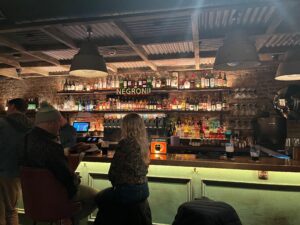 I’ve never seen U2 live. But like everyone of my age and fighting weight, I saw Rattle & Hum a fair few times, and back in the 1980s, I rented the U2: Live at Red Rocks VHS not infrequently. And while I completely agree that a lot of the stuff of that era of the band still slaps, I can see that the kids might find certain things about U2 a bit, well, cringe. But as a transplant to Dublin, I also don’t have that immediate animosity some seem to have to anything Bono-related – I’m essentially U2-agnostic.
I’ve never seen U2 live. But like everyone of my age and fighting weight, I saw Rattle & Hum a fair few times, and back in the 1980s, I rented the U2: Live at Red Rocks VHS not infrequently. And while I completely agree that a lot of the stuff of that era of the band still slaps, I can see that the kids might find certain things about U2 a bit, well, cringe. But as a transplant to Dublin, I also don’t have that immediate animosity some seem to have to anything Bono-related – I’m essentially U2-agnostic.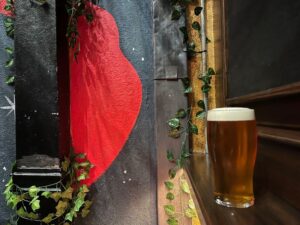 Why the U2 preamble? Well, because this week’s pub, The Dockers Bar, was
Why the U2 preamble? Well, because this week’s pub, The Dockers Bar, was 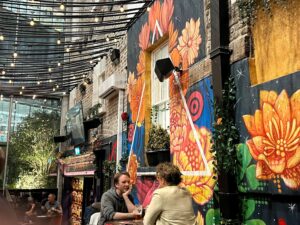 And what do those current regulars find at The Dockers Bar? It must be said that they were there in numbers on a weekend evening, so clearly, it’s working for them – is it the combination of some excellent independent Irish beer options (Rascals, Kinnegar, Trouble, Wicklow Wolf)? Or maybe they are mostly there for the Guinness, or perhaps the cocktails? The more-interesting-than-usual nibbles? In any event, it was a packed after-work scene.
And what do those current regulars find at The Dockers Bar? It must be said that they were there in numbers on a weekend evening, so clearly, it’s working for them – is it the combination of some excellent independent Irish beer options (Rascals, Kinnegar, Trouble, Wicklow Wolf)? Or maybe they are mostly there for the Guinness, or perhaps the cocktails? The more-interesting-than-usual nibbles? In any event, it was a packed after-work scene.